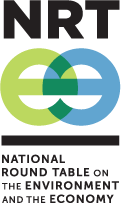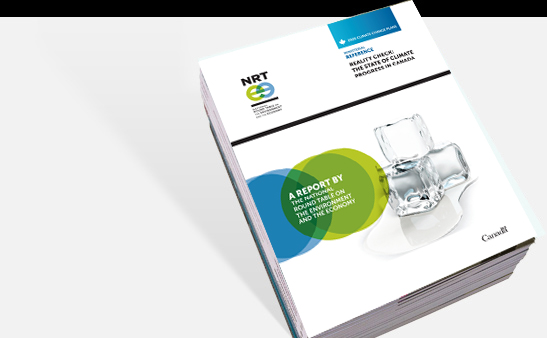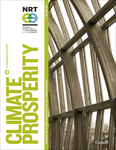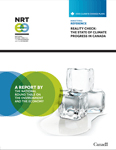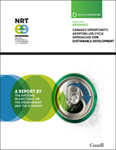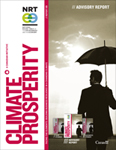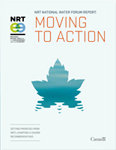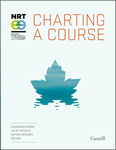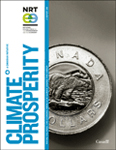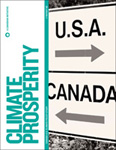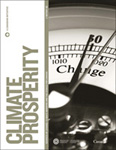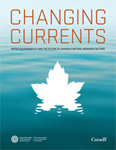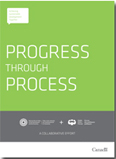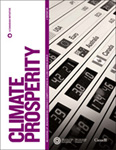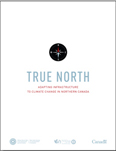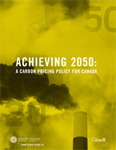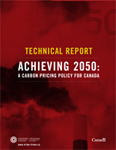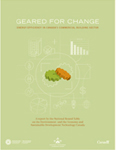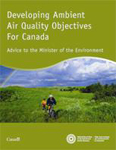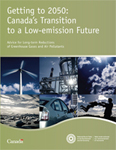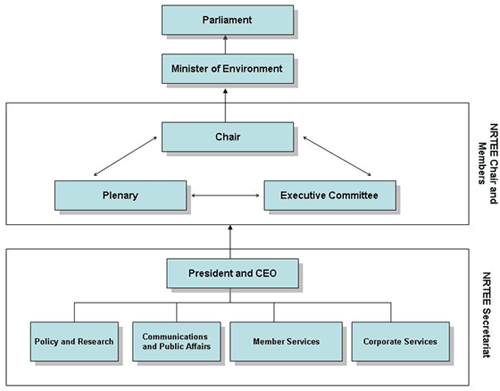NRTEE – 2011-2012 – Report on Plans and Priorities
The Honourable Peter Kent
Minister of the Environment
Table of Contents
Message from the President and CEO
- 1.1 Raison d’être and Responsibilities
- 1.2 Strategic Outcome(s) and Program Activity Architecture (PAA)
- 1.3 Planning Summary
- 1.4 Alignment with Government of Canada Outcomes
- 1.5 Contribution of Priorities to Strategic Outcome
- 1.6 Risk Analysis
- 1.7 Expenditure Profile
- 1.8 Estimates by Vote
Section 2: Analysis of Program Activities by Strategic Outcome
- 2.1 NRTEE Strategic Outcome
- 2.2 Program Activities (PA)
- 2.3 Program Activity : Advisory Program on Environment and Economy Issues
- 2.4 Program Activity: Internal Services
- 2.5 Performance Measurement in 2010–2011
- 2.6 Benefits for Canadians
Section 3: Supplementary Information
- 3.1 Summary of Capital Spending by Program Activity
- 3.2 Green Procurement
- 3.3 Future-oriented Financial Highlights
- 3.4 Other Items of Interest
- 3.5 NRTEE Contact Information
Message from the President and CEO
The National Round Table on the Environment and the Economy (NRTEE or Round Table) is an independent policy advisory body reporting to Parliament through the Minister of the Environment. The purpose of the Round Table, according to the NRTEE Act (1993), is “to play the role of catalyst in identifying, explaining, and promoting, in all sectors of Canadian society and in all regions of Canada, principles and practices of sustainable development.”
Drawing on the insight and experience of NRTEE members, the Round Table examines the environmental and economic implications of priority issues and offers integrated advice on how to address them, with the ultimate goal of influencing federal policy development and decisions in other key sectors on these issues. Since its formation over 20 years ago, the NRTEE has established a reputation for working effectively in highly contentious areas and for providing independent, credible, and balanced research and advice.
The Round Table has established two major policy research priorities for 2011- 2012: Climate Prosperity, or the economic risks and opportunities of climate change for Canada, and Water Sustainability and the Natural Resources Sectors. We plan to complete at least two of the next four policy advisory reports as part of our innovative and comprehensive Climate Prosperity series and advance work on the remainder. These include assessing the net national economic costs of climate change to Canada under various scenarios, setting out a policy pathway for a national climate adaptation strategy, and setting out a policy pathway for a national low-carbon growth plan. We plan to complete phase II of our water program with a new policy advisory report on water governance and management. To support these and other initiatives, we will enhance our strategic communications and stakeholder engagement activities and begin to use social media techniques in our work.
Ongoing priorities for the Round Table will include abiding by its legislated responsibilities under the Kyoto Protocol Implementation Act, responding to requests from government for research and policy advice on specific topics of concern, and identifying emerging issues for the future that may need study and advice.
Our unique role as a knowledgeable, independent convener of views and information from across the spectrum of society has allowed us to make a substantial contribution to sustainable development and national prosperity. We are committed to assisting the Government of Canada, Parliament, and Canadians in continuing along this path.
David McLaughlin
NRTEE President and Chief Executive Officer
Section 1: Overview
1.1 Raison d’être and Responsibilities
The purpose of the National Round Table on the Environment and the Economy (NRTEE or Round Table) is to play the role of catalyst in identifying, explaining, and promoting, in all sectors of Canadian society and in all regions of Canada, principles and practices of sustainable development. The NRTEE interprets this broad mandate through a strategic focus on issues of national interest at the intersection of the environment and the economy. Through its work, the NRTEE strives to influence policy development and decisions on issues pertaining to the environment and economy. These promote economic prosperity for all Canadians while striving to preserve the environment for current and future generations.
Purpose
- undertaking research and gathering information and analyses on critical issues of sustainable development;
- advising governments on ways of integrating environmental and economic considerations into their decision-making processes and on global issues of sustainable development;
- advising those sectors and regions on ways of incorporating principles and practices of sustainable development into their activities;
- promoting the understanding and increasing public awareness of the cultural, social, economic, and policy changes required to attain sustainable development; and
- facilitating and assisting cooperative efforts in Canada to overcome barriers to the attainment of sustainable development.
NRTEE, Section 4
Created in 1988 by the Prime Minister, the National Round Table on the Environment and the Economy is an independent national advisory body reporting to the federal government and Parliament through the Minister of the Environment (see Figure 1 for the agency’s internal organization and relationship to the federal government). The Round Table had its status formalized in 1993 by an Act of Parliament, Bill C-72, An Act to establish the National Round Table on the Environment and the Economy (NRTEE Act).
The NRTEE is a departmental corporation (Financial Administration Act, Schedule II).
The work of the NRTEE is directed by the Round Table members drawing on their expertise and insight. The members are part-time Governor-in-Council appointees. They represent different regions of Canada and are distinguished leaders from business, labour, universities, public service, and environmental organizations.
A Secretariat in Ottawa, headed by a President and CEO, supports the members. The Round Table normally meets four times each year in plenary sessions where members discuss priorities and review and approve the work of the Secretariat.
General information about the NRTEE and its membership can be found on the agency’s website at www.nrt-trn.ca
Figure 1: NRTEE internal organization and relationship to the federal government
1.2 Strategic Outcome(s) and Program Activity Architecture (PAA)
The NRTEE aims to achieve the following single strategic outcome: Federal policy development and decisions in other key sectors are influenced by advice on sustainable development issues pertaining to the environment and the economy.
This RPP is based on the Treasury Board-approved PAA shown in Figure 2 below.
Figure 2: NRTEE Program Activity Architecture (PAA)
1.3 Planning Summary
1.3.1 Financial Resources ($ thousands)
The financial resources table below provides a summary of the total planned spending for
the NRTEE for the next three fiscal years.
Total Planned Spending
| 2011–2012 | 2012–2013 | 2013–2014 |
| 5,249.2 | 5,249.2 | 5,249.2 |
1.3.2 Human Resources (Full-time Equivalent – FTE)
The Human Resources tables provide a summary of the total planned human resources for the NRTEE for the next three years.
Total Planned Human Resources
| 2011–2012 | 2012–2013 | 2013–2014 |
| 30 | 30 | 30 |
1.3.3 Planning Summary Table
| Strategic Outcome: Federal policy development and decisions in other key sectors are influenced by advice on sustainable development issues pertaining to the environment and the economy. | |||||
| Performance Indicator: Extent to which NRTEE advice is considered in policy decisions by federal decision makers | Targets: NRTEE advice is partly responsible for a number of policy decisions and is often considered in assessing relevant policy choices made by federal government policy makers. | ||||
| Program Activity1 | Forecast Spending 2010–11 ($ thousands) | Planned Spending ($ thousands) | Alignment to Government of Canada Outcomes |
||
|---|---|---|---|---|---|
| 2011–12 | 2012–13 | 2013–14 | |||
|
Advisory Program on Environment and Economy Issues |
3,329.0 |
Strong Economic Growth |
|||
| Total Planned Spending | 3,333.3 | 3,333.3 | 3,333.3 | ||
1 Treasury Board Secretariat approved program activity, please access the Main Estimates online http://www.tbs-sct.gc.ca/rpp/2010-2011/index-eng.asp?acr=1593
| Program Activity | Forecast Spending 2010–11 ($ thousands) |
Planned Spending | ||
|---|---|---|---|---|
| 2011–12 | 2012–13 | 2013–14 | ||
| Internal Services |
1,914.2 | 1,915.9 | 1,915.9 | 1,915.9 |
1.4 Alignment with Government of Canada Outcomes
In 2011–2012, the NRTEE will continue to contribute to the Government of Canada’s outcome of Strong Economic Growth by providing relevant research and policy advice on how Canada can address sustainable development issues in the medium and long term. The NRTEE’s advice, if implemented, is consistent with Canada’s national interest and the government’s objective of building a globally competitive, sustainable, technologically innovative economy that benefits all Canadians.
1.5 Contribution of Priorities to Strategic Outcome
For 2011–2012, the agency has identified two key operational priority areas, both of which contribute to the NRTEE’s single strategic outcome.
| Priorities | Type | Links to Strategic Outcome | Description |
| To produce advice to decisionmakers on environment and economy issues | Ongoing | Federal policy development and decisions in other key sectors are influenced by advice on sustainable development issues pertaining to the environment and the economy. |
Timely, actionable, and relevant advice is essential to the NRTEE’s credibility and its ability to influence decision makers. Plans for 2011–2012 include two key policy research areas:
(See Section 2 for additional information and other plans.) |
| To promote advice to decision makers on environment and economy issues | Ongoing | Federal policy development and decisions in other key sectors are influenced by advice on sustainable development issues pertaining to the environment and the economy. |
Dissemination and promotion of the NRTEE’s policy advice is an essential component of its work. In addition to the promotion and dissemination of Round Table Reports, there will be a specific focus on strengthening and extending the reach and influence of the NRTEE through a comprehensive strategic communication process and the examination of the use of social media as a communications and engagement tool. (See Section 2 for additional information.) |
1.6 Risk Analysis
1.6.1 Organizational Context
The Secretariat, headed by a President and CEO, provides program management, policy and research analysis, communications, and administrative services to the NRTEE.
Issues to be examined by the NRTEE are identified through an internal screening and scoping process, in which the final decisions reflect current policy, environmental, economic or political priorities together with NRTEE members’ combined interests. The NRTEE reinforces members’ expertise and advice with stakeholder consultation and original policy research undertaken or directed by the Secretariat, as part of its approach to conducting its work.
The NRTEE can respond to specific research requests from the federal government. In addition, the Round Table has a legislated responsibility to respond as per the Kyoto Protocol Implementation Act to the federal government’s annual Climate Change Plan, within 60 days. This annual reporting requirement exists until 2012.
1.6.2 Risk and Challenges
The NRTEE seeks to influence the government’s approach to important sustainable development issues. To accomplish this, the NRTEE must produce and promote relevant, neutral, credible advice in a timely manner. Its ability to do so is affected by both risks and challenges. These are discussed below.
- A key indicator of the NRTEE’s performance is its ability to influence government policy development. In Canada, particularly for the issues typically examined by the NRTEE, federal policy is not developed in isolation. It is affected by the government’s relationships with other Canadian and international jurisdictions and by a range of other factors over which the NRTEE has no control, creating a complex decision-making environment.
- The ability to influence government is a difficult performance indicator to measure. In addition to the challenge described above, the NRTEE’s influence on government decisions may translate into action only years after NRTEE’s reports and recommendations are published. Therefore, the causal effect may not always be clear.
- The NRTEE often casts its policy agenda forward as it deals with contentious sustainability issues, risking perceived asymmetry with current government agendas, time frames, and policy frameworks.
- Independent third-party feedback consistently recognizes the Round Table’s two key strengths and unique elements as its high quality research and its convening power – the ability to create a safe neutral space to discuss difficult issues. These two pillars are critical to the success of the Round Table’s work and thus one of its key risks is
reputational. - The composition of the membership of the Round Table is a key element in reviewing research and reports, engaging with stakeholders and in how the Round Table is perceived. A membership not representative both geographically and from a constituency standpoint runs the risk of weakening the reputation of the Round Table and its ability to provide timely, relevant advice. Having sufficient members appointed in a timely manner will help alleviate any such risks.
1.7 Expenditure Profile
The NRTEE’s overall financial resources and expenditures profile is very stable, with only minor fluctuations over time, providing a consistent resource platform for the planning and delivery of activities, research, and reports.
1.8 Estimates by Vote
Estimates by Vote are presented in the 2011–12 Main Estimates which are available here:
http://www.tbs-sct.gc.ca/est-pre/20112012/me-bpd/info/info-eng.asp
Section 2: Analysis of Program Activities by Strategic Outcome
2.1 NRTEE Strategic Outcome
The NRTEE has a single strategic outcome:
Federal policy development and decisions in other key sectors are influenced by advice on sustainable development issues pertaining to the environment and the economy.
The NRTEE’s approach to achieving its strategic outcome is to produce, disseminate, and promote policy advice about sustainable development challenges and opportunities; to increase the understanding of decision-makers of these issues; to inform the debate on current and emerging issues; and to endeavour to ensure that NRTEE advice is considered in policy decisions.
Target for 2011–2012: NRTEE advice is considered in assessing relevant policy choices made by federal government policy makers.
Performance indicator: A key indicator of the NRTEE’s performance is the extent to which federal government policy makers consider the NRTEE’s advice in federal policy decisions and use its research results when developing policy recommendations.
2.2 Program Activities (PA)
The NRTEE has two program activities under the Main Estimates:
- Advisory Program on Environment and Economy Issues
- Internal Services
Each will be described below in Sections 2.3 and 2.4. All the expected results from the Program Activities directly support the NRTEE’s two key priorities as well as the NRTEE’s single strategic outcome.
2.3 Program Activity : Advisory Program on Environment and Economy Issues
PA Description
Raising awareness and understanding among Canadians and their governments about the challenges of sustainable development and promoting viable solutions are vital to Canada’s environmental and economic future. Through this program, the National Round Table on the Environment and the Economy (NRTEE) strives to influence policy development and decision making on select sustainable development issues pertaining to the environment and the economy.
The NRTEE conducts research and analysis and produces information and advice on selected sustainable development issues. The agency promotes its findings and recommendations through a variety of communications channels such as media relations, stakeholder briefings and other events, publications, and the agency website to influence policy and decisions of policy makers in the federal government and other key sectors such as other levels of government, industry, and non-government organizations across the country.
| Program Activity: Advisory Program on Environment and Economy Issues |
|||||
|---|---|---|---|---|---|
| Human Resources (FTEs) and Planned Spending ($ thousands) | |||||
| 2011–12 | 2012–13 | 2013–14 | |||
| FTEs | Planned Spending | FTEs | Planned Spending | FTEs | Planned Spending |
| 17 | 3,333.3 | 17 | 3,333.3 | 17 | 3,333.3 |
| Expected Result | Performance Indicators | Targets | |||
| Increased awareness and understanding | Level of awareness and understanding by federal decision makers of NRTEE advice on selected issues | Decision makers have high level of awareness of challenges and potential solutions proposed by the NRTEE. NRTEE is perceived as a leader, able to bring stakeholders together to discuss current and emerging issues. | |||
| Useful recommendations and advice | Usefulness of policy advice and recommendations | Informed and regular contact with government decision makers at all appropriate levels. Detailed policy briefings provided. Policy analysis is seen as relevant, timely, and useful. High stakeholder satisfaction. | |||
| Effective communication of recommendations | Quality and reach of external communications | High visibility with stakeholders. Communications reach wide range of target audiences. Broad range of communications products, perceived to be of high quality. Periodic media coverage, generally positive. | |||
| High quality research and consultations | Effectiveness of stakeholder consultation | Frequent consultation with stakeholders at national and regional levels. Consultations confirm high-quality NRTEE research and build support for policy advice. High level of participation in NRTEE events. Events are perceived to have high added value. | |||
Program Activity 1—Plans and Initiatives for 2011–2012 and Beyond:
2.3.1 Generate Policy Advice
The Round Table’s policy research and analysis will focus on two key initiatives:
Water Sustainability and the Future of Canada’s Natural Resource Sectors
The sustainability of Canada’s agriculture, energy, forestry, and mining sectors is heavily dependent on the continued availability of water. Rising water consumption/use and the prospects of climate change are two key drivers that may potentially affect critical watersheds across the country, as well as the economic prosperity of Canada’s important natural resource sectors.
This program seeks to evaluate the best policies, approaches and mechanisms that governments, industry, and water management authorities can use to manage water and foster both ecosystem health and the various resource sectors’ economic sustainability.
The NRTEE’s work will explore these issues through a phased approach and take a forward-looking perspective. Building on extensive consultations with industry and other stakeholders, a first report, Changing Currents, was published in June, 2010. This report described the key water issues for those sectors and highlighted areas for recommendations and action. The NRTEE is investigating those key issues further, which will lead to the publication of a second report in 2011-12. This will focus on policy recommendations to improve water governance and management in Canada and foster long-term sector sustainability.
Specifically the Round Table will examine:
- Future water demands by natural resource sectors
- Policy instruments for water allocation
- Water use information and accounting
- Governance structures and processes including collaborative governance
For more information go to: http://nrt-trn.ca/water/water-sustainability-and-the-future-of-canadas-natural-resource-sectors-2
Climate Prosperity: The Economic Risks and Opportunities of Climate Change for Canada
Climate Prosperity is a two year policy initiative focussing on two principal research streams.
- The economic implications for Canada resulting from a changing climate, how we should adapt to it and the costs associated with this.
- The economic implications for Canada resulting from the transition to a low-carbon economy, what this means for our future competitiveness, and what strategies are needed to succeed.
In 2010-11, the Round Table published its first three reports in its seven part series on Climate Prosperity; Measuring Up: Benchmarking Canada’s Competitiveness in a Low – Carbon World, Degrees of Change: Climate Warming and the Stakes for Canada and Parallel Paths: Canada-U.S. Climate Policy Choices.
In the coming fiscal year the Round Table plans to advance its extensive work on this initiative and the final four reports in the series:
- Report 4: Net National Costs of Climate Change. This report will provide for the first time, national economic costing of the impact of climate change on Canada, together with a detailed look at three key sectors: coastal zones, human health, and forests.
- Report 5: Policy Pathway Report for Climate Impacts and Adaptation. This advisory report will provide a range of policy pathways and actions to help Canada take advantage of its potential to adapt to a changing climate.
- Report 6: Policy Pathway Report for Global Low-Carbon Transition. This advisory report will provide policy pathways and actions necessary for Canada to thrive in a global low-carbon economy in areas such as energy, innovation, skills, investment and governance.
- Report 7: Citizen Engagement. The last report in the series will highlight input from Canadian citizens to ensure action on climate change is underpinned by a broad social consensus informed by democratic dialogue and debate.
More information on the initiative can be found at http://nrt-trn.ca/climate/climate-prosperity.
2.3.2 Comply With Bill C-288
The NRTEE will comply with its annual legislated responsibilities under the Kyoto Protocol Implementation Act with respect to the government’s Climate Change Plan and Statement. In order to carry out its statutory obligations, the NRTEE will undertake research, gather information, and produce a written response as required within the mandatory time frame.
2.3.3 Respond to Government References
The NRTEE recognizes the importance of responding to government “references” or requests for advice on specific issues, and will do so as required.
2.3.4 Promote Advice
Promoting the research and policy advice of the Round Table is essential to raising awareness and influencing government. The NRTEE promotes its advice through media relations, its website, direct electronic distribution to stakeholders, as well as by undertaking outreach activities, speaking engagements, and collaborative activities with non-governmental sectors, stakeholders, academia, and other organizations. Each targeted audience and activity is critical to the agency’s efforts to reinforce its acknowledged reputation as a credible and trustworthy source of research and advice.
Enhance Stakeholder Communications Activities
In 2011–2012, the NRTEE will continue its extensive briefings and stakeholder engagement on its ongoing work. These activities will be part of a targeted effort to increase the level of awareness and understanding of its recommendations and advice by federal decision makers and national and regional stakeholders, with the ultimate goal of influencing policy development on the issues addressed. The meetings provide a forum to present the NRTEE’s advice and also to hear from stakeholders. This exchange of ideas is important for ensuring that the advice is useful and relevant; it also assists in framing future possible work on specific issues.
The agency will continue its efforts to improve the reach of its advice and influence through increased contacts with government, the media, NGOs, stakeholders, and others. Recent efforts to improve linkages and coordination within the portfolio will continue. By increasing its visibility, the NRTEE plans to raise its profile with the public and, in turn, strengthen its influence with various levels of government. The NRTEE will reinforce its efforts to more broadly communicate its role as a public policy advisor, and will utilize its various members to give voice to that message.
Improve Strategic Communications
During 2010-2011 an in-depth examination of the ‘NRTEE Brand’ was conducted. The results confirmed the Round Table’s position as a trusted, credible, balanced source of high quality research with a unique capacity to convene disparate parties on difficult issues in a safe neutral environment. The NRTEE will use and leverage this perception to guide and reinforce its strategic communication efforts going forward. This will be accomplished principally through the dissemination of the Round Table’s policy reports. These reports are informed by meetings with, and by research derived from, leading experts and stakeholders from across the country.
In 2011-2012 the NRTEE will explore, and implement where feasible, a social media marketing strategy. This has the potential to encourage citizen and stakeholder engagement and participation on new levels, helping to drive the national conversation on sustainable development issues. The effective use of social media tools will enhance the Round Table’s reputation as a credible and reliable research body and help further establish it as a leader in national thinking on these issues. It will also establish a more engaged and inter-active stakeholder community.
The NRTEE’s recent efforts to improve its website and increase its use utilization of digital media to disseminate its reports have proven very successful. Website visits have more than doubled from the prior year and Round Table reports are being downloaded from the website in unprecedented numbers.. What is not currently well understood are details on the composition of website visitors. The NRTEE plans to invest in web analytical tools to better understand its website traffic and to use this information to better and more strategically target its constituencies and be more effective in its communications.
The recent branding exercise and strategic communications assessment confirmed that the NRTEE’s core communication messages remain essentially valid. Key communications messages for 2011-2012 are as follows:
- A leading national public policy organization that offers critical advice on how best to integrate environmental and economic concerns as part of sustainable development.
- A credible and trustworthy source of policy guidance, thanks to its original research and reliance on input from experts and interests.
- A trusted, neutral space to discuss issues and solutions affecting sustainable development.
- A catalyst for needed public policy ideas in sustainable development.
2.4 Program Activity: Internal Services
| Human Resources (FTEs) and Planned Spending ($ thousands) | |||||
|---|---|---|---|---|---|
| 2011–12 | 2012–13 | 2013–14 | |||
| FTEs | Planned Spending | FTEs | Planned Spending | FTEs | Planned Spending |
| 13 | 1,915.9 | 13 | 1,915.9 | 13 | 1,915.9 |
Program Activity 2—Plans and Initiatives for 2011–2012 and Beyond:
There are no major planned initiatives planned for the Internal Services Activity for 2011- 12. After several years of significant undertakings, the focus will be on consolidation and refinement of earlier information management and information technology change initiatives.
2.5 Performance Measurement in 2011–2012
The NRTEE’s Performance Measurement Framework and the Management Resources and Results Structure are used as the basis for identifying the expected results and indicators.
Key data sources for populating the framework are as follows:
- Feedback from federal decision-makers and national stakeholders.
- Feedback provided by participants after NRTEE consultation sessions.
- Operational data related to communications and overall management of the NRTEE.
- Website traffic and analytics.
The NRTEE plans to monitor the usefulness and relevance of the various elements of the framework and to make adjustments as required to ensure their ongoing value to management for planning and decision making.
2.6 Benefits for Canadians
The NRTEE benefits Canadians by addressing an issue of critical importance to Canada’s long-term prosperity and quality of life, namely sustainable development. The agency provides forward recommendations to decision-makers with the ultimate goal of influencing policy on issues at the nexus of the environment and the economy. These recommendations, are consistent with Canada’s national interest and the government’s objective of building a globally competitive, sustainable, technologically innovative economy.
Section 3: Supplementary Information
All electronic supplementary information tables found in the 2011–12 Report on Plans and Priorities can be found on the Treasury Board of Canada Secretariat’s website at http://www.tbs-sct.gc.ca/rpp/2010-2011/info/info-eng.asp
3.1 Summary of Capital Spending by Program Activity
3.2 Green Procurement
3.3 Future–oriented Financial Highlights
The future-oriented financial highlights presented in this section of the RPP are intended to serve as a general overview of the NRTEE’s operations. These future-oriented financial highlights are prepared on an accrual basis to strengthen accountability and improve transparency and financial management.
Future-oriented Condensed Statement of Operations (Unaudited)
For the Year (Ended March 31)
($ thousands)
| Future-Oriented 2011–12 |
|
| Expenses Total Expenses |
5,824 |
| Revenues Total Revenues |
1 |
| Net Cost of Operations | 5,823 |
The future-oriented Statement of Operations and applicable notes can be found on the NRTEE website at http://nrt-trn.ca/corporate-reporting/report-on-plans-and-priorities-–-2011-2012/2011-2012-rpp-future-oriented-financial-information.
3.4 Other Items of Interest
NRTEE Members
Members meet four times a year to review research, approve reports, and agree on new priorities for action. Members often participate in expert advisory committees and on NRTEE task forces. They bring unique expertise as well as a broader perspective to the Round Table, essential to enriching the NRTEE’s results.
(At December 31, 2010; subject to change during the year)
NRTEE Chair
Bob Page
Calgary, Alberta
David Bishop
Regina, Saskatchewan
Elizabeth Brubaker
Toronto, Ontario
The Honourable Pauline Browes, P.C.
Toronto, Ontario
Dianne Cunningham
London, Ontario
Anthony Dale
Toronto, Ontario
John Hachey
Lachine, Québec
Timothy Haig
Oakville, Ontario
Christopher Hilkene
Toronto, Ontario
Franklin Holtforster
Ottawa, Ontario
Robert Kulhawy
Calgary, Alberta
Donald MacKinnon
Toronto, Ontario
Robert Mills
Red Deer, Alberta
Mark Parent
Halifax, Nova Scotia
Richard Prokopanko
Vancouver, British Columbia
Robert Slater
Ottawa, Ontario
3.5 NRTEE Contact Information
Jim McLachlan
Director, Corporate Services
344 Slater Street, Suite 200
Ottawa, ON K1R 7Y3
Tel: 613-947-4507
